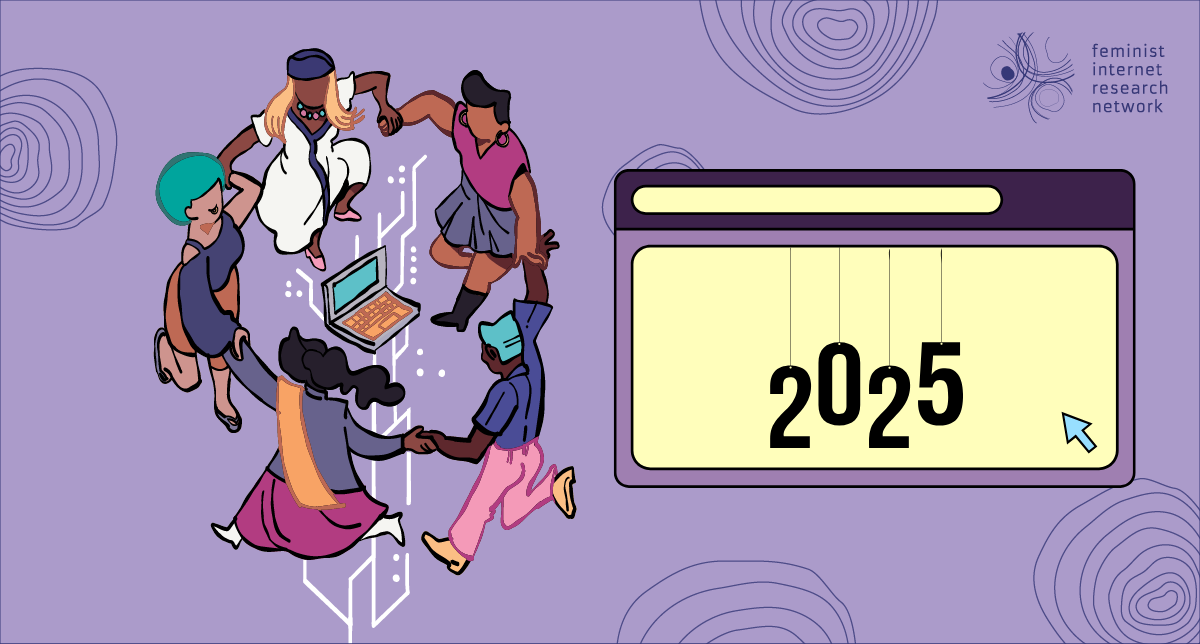2024 in rewind: From reflection to action

2024 marked the seventh year of the Feminist Internet Research Network (FIRN) since its inception in 2019. In April 2024, we embarked on the third cycle of the FIRN project with 10 new research partners from the Global South in an 18-month research project focusing on technology-facilitated gender-based violence (TFGBV).
Looking back at 2024, despite the alarming developments around the world – fragile democracy and the rise of right-wing nationalism, extreme and dehumanising violence and conflict, cooperation between governments and tech giants to censor dissent and crack down on human rights – we also have good moments and glimmers of hope. In this article, we weave together the glimmers of hope that emerged from numerous engagements and exchanges with our partners, collaborators and advisors throughout 2024 as a way to honour the small wins we made along the journey collectively.
In this article, we weave together the glimmers of hope that emerged from numerous engagements and exchanges with our partners, collaborators and advisors throughout 2024 as a way to honour the small wins we made along the journey collectively
1. Amplifying the diverse Global South perspectives
In 2024, we continue to see progress with TFGBV shifting from the periphery to the forefront of discussion at various policy spaces such as the DataFest Africa organised by Pollicy, Forum on Internet Freedom in Africa (FIFAfrica) organised by CIPESA, Global Gathering organised by Team CommUNITY, Sexual Violence Research Initiative (SVRI) Forum, Southeast Asia Research Centre for Digital Tech and Society (SEADS) Inaugural Roundtable, Beijing+30 Civil Society Consultation on Strategies to End Discrimination and Violence Against Women, and AWID International Forum, among others.
At the same time, it remains that the current discourse on TFGBV is skewed toward a Global North agenda, leaving behind the critical feminist perspective from the Majority World. The gap between research and policy was also observed at the DataFest Africa 2024 (July, in Nairobi, Kenya), where leveraging data findings for policy advocacy faced difficulties, as most current research has not kept pace with the recent political and techno-social shifts within the Africa region. There is a dearth of research that employs an intersectional lens to show the multi-layered structural injustices experienced by women and gender-diverse people on various digital platforms, particularly in relation to TFGBV.
There is a dearth of research that employs an intersectional lens to show the multi-layered structural injustices experienced by women and gender-diverse people on various digital platforms, particularly in relation to TFGBV.
In numerous conversations that FIRN has held over the years, many have shared that research agendas are frequently driven by Western funding rather than being shaped by local organisations. The absence of long-term, stable and flexible funding has further complicated the ability of organisations to establish their own agendas. Such a critical knowledge gap means that solutions and advances in policy making are not progressing in ways that sufficiently address the needs of the community from the Global South.
Given the circumstances, the global renewed sense of urgency to tackle TFGBV presents an opportunity for us to leverage in order to influence and shape policy and strategy by centring and mainstreaming research and knowledge from the Global South. Current research conducted by FIRN’s partners aims to address the missing intersectional lens when it comes to our understanding of TFGBV, and we are hopeful that this will bring about substantial and nuanced understanding of violence and power in the Global South, and also context-responsive recommendations for policy and advocacy approaches.
2. Resisting violence, reimagining meaningful participation
Through the research done by FIRN’s partners, we continue to learn of the diverse strategies used by women and gender-diverse people to protect themselves in digital spaces, striving to stay safe while also maintaining their voices, sustaining activism, and navigating online interactions in an increasingly hostile environment. This was highlighted during FIRN’s panel at the Global Gathering 2024 (September, in Estoril, Portugal), along with our partners and collaborators from Brazil, Ghana, Kenya and India.
Mainstream discourse tends to idealise techno-centric solutions to address TFGBV and overshadows the embodied resilience within communities. It is important to remember the long herstory of communities engaging in multiple forms of collective and individual resistance rooted in patriarchy, colonialism, imperialism, capitalism and racism. To exist is to resist. In this context, the strategies employed and shared are a reflection and continuation of everyday and historical resistance which the community had been practising and are now extending to digital spaces.
It is important to remember the long herstory of communities engaging in multiple forms of collective and individual resistance rooted in patriarchy, colonialism, imperialism, capitalism and racism. To exist is to resist.
Among others, we learn that community, friendship and solidarity among Black Brazilian women played a crucial role in coping with TFGBV and offered a much needed network of care which strengthened their collective resilience. In Ghana, queer people had adopted “technology opacity” as a strategy to resist being silenced and withdrawn; they remained visible strategically only to their community and intended audience, ensuring safety while still maintaining connections and self-expression. This practice reflects a broader tradition of queer communities using creative approaches, such as storytelling, to share information and resist societal pressures while staying protected.
Our team member Diana Bichanga has written a reflection on the Global Gathering and the panel she moderated − click here to read the full reflection.
3. Connecting knowledge, bridging academia and civil society
Our engagement with gender-related research also reminds us that not all gender-based analysis is feminist by default. When research considers women as a homogenous category, usually as cisgender women from privileged groups, it overlooks a larger structural ecosystem that enables power inequalities that emerge from gender, ethnicity, nationality, class, sexuality, ability, location and various axes of difference. FIRN in particular has been centring feminist methodological inquiry and feminist ways of knowing in the research design with our research partners as building blocks to knowledge and findings that surface the fluidity, messiness and contradictions in human lives.
Our engagement with gender-related research also reminds us that not all gender-based analysis is feminist by default.
Given the above, one of FIRN’s core intentions has always been to infiltrate methodological frameworks and challenge the all-encompassing objectivity of knowledge by centring the learnings and reflection from the Global South. In 2024, we made some progress in engaging with academic spaces by participating in two academic events: Psychological Society of South Africa (PsySSA) 2024 (October, in Johannesburg, South Africa) and Southeast Asia Research Centre for Digital Tech and Society (SEADS) Inaugural Roundtable (September, in Kuala Lumpur, Malaysia).
During PsySSA, FIRN was the only group that presented a paper on TFGBV. The presentation focused on a decolonial feminist exploration of Black women’s and gender-non-conforming persons’ experience online. Considering diverse identities and experiences, the panel examined how the power embedded in technology sustains violence and online abuse, and how TFGBV affects Black women and gender-non-conforming individuals on digital platforms
Meanwhile, at the SEADS Inaugural Roundtable, academics and activists from Southeast Asia were invited to discuss the root causes of TFGBV and shared our recommendations. The conversations in both spaces show that academia is starting to invest resources and effort into the topic and this presents an open door for FIRN and partners to intervene and co-shape the knowledge-building process.
4. Research communication as a political act
In 2024, the FIRN team also reflected on our practices in communicating and disseminating our knowledge and research findings, an aspect that is less thought of in the process of knowledge production. Late last year, we extended the FIRN team with the addition of a communications officer, with the belief that communication is an integral part of the political transformation that FIRN envisioned.
An earlier paper by Rathi, Sheshadri and Tandon argued that traditional dissemination practices around research often privilege communications to external audiences and for policy reform purposes. The demarcation of knowledge production and usage of knowledge thus reinforces the hierarchy of power. This starts with asking how we can extend the same feminist principles in our research to the way knowledge is being translated, communicated and channelled into usage and action. In other words, we want to avoid “objectivity” on how knowledge should be used, received and questioned.
The demarcation of knowledge production and usage of knowledge thus reinforces the hierarchy of power.
As a start, we invited our partners to share their reflections on fieldwork through the Feminist Sound Bites. We also invited our feminist research communities to rethink and revisit our understanding of violence and power through this article so that they can better recognise and respond to the realities of how these issues manifest in the context of war, genocide and conflict.
5. Expanding and challenging understandings of TFGBV
With several ongoing wars, genocides and conflicts, along with our partners, advisors and collaborators, we have fostered a broader comprehension of the discussions surrounding TFGBV in multiple international conferences. This was notably highlighted during our panel at the AWID International Forum 2024 (December, in Bangkok, Thailand), where many shared that TFGBV can also manifest itself in the form of extreme silencing through digital exclusion, propaganda and gendered disinformation, to legitimise violence and dehumanise minorities, and silence those who dissent and speak up. Such a knowledge-making process around technology and violence by feminist research communities is critical in directing and expanding on the “who is accountable?” question by visualising different actors involved in causing harm and destruction regionally and globally.
Please read our reflection: Reimagining, broadening and expanding TFGBV and transnational solidarity
6. Connecting learnings from different learnings
FIRN’s work continues to facilitate an interdisciplinary approach to our learnings and to understanding the diverse realities of women and gender-diverse people. During our participation at the Forum on Internet Freedom in Africa (FIFAfrica) (September, in Dakar, Senegal), along with other collaborators, we provided a critical feminist intervention to current framing of misinformation and disinformation, which often overlooks gender-specific aspects of the phenomenon. Although different in concept, both TFGBV and gendered disinformation can happen simultaneously and they reinforce one another, often with the aim of silencing women and gender-diverse people and hindering their full and equal participation in all spheres of life.
At the same time, being present at the Global Gathering 2024 (September, in Estoril, Portugal) and AWID International Forum (December, in Bangkok, Thailand) alongside digital rights advocates and activists working on a wide range of issues highlighted the interconnectedness of our struggles. It emphasised that knowledge is co-created through cross-border and cross-discipline dialogue and exchange between different regions and communities, while rejecting an isolated and binary approach to our activism.
It emphasised that knowledge is co-created through cross-border and cross-discipline dialogue and exchange between different regions and communities, while rejecting an isolated and binary approach to our activism.
Forward
We progress into the new year with full hearts, inspired by the dedication and courage of our feminist research communities, and with great excitement about launching 10 new research outputs and reports with our partners. These research outputs will provide a more nuanced and intersectional feminist analysis based on a diversity of identities, realities and lived experiences from the Global South − a much-needed contribution to expand the current discourse around TFGBV. In 2025, we strive to translate these critical Global South feminist perspectives into policy and recommendations, so that the needs of women and gender-diverse and queer people are taken into consideration in decision-making processes.
